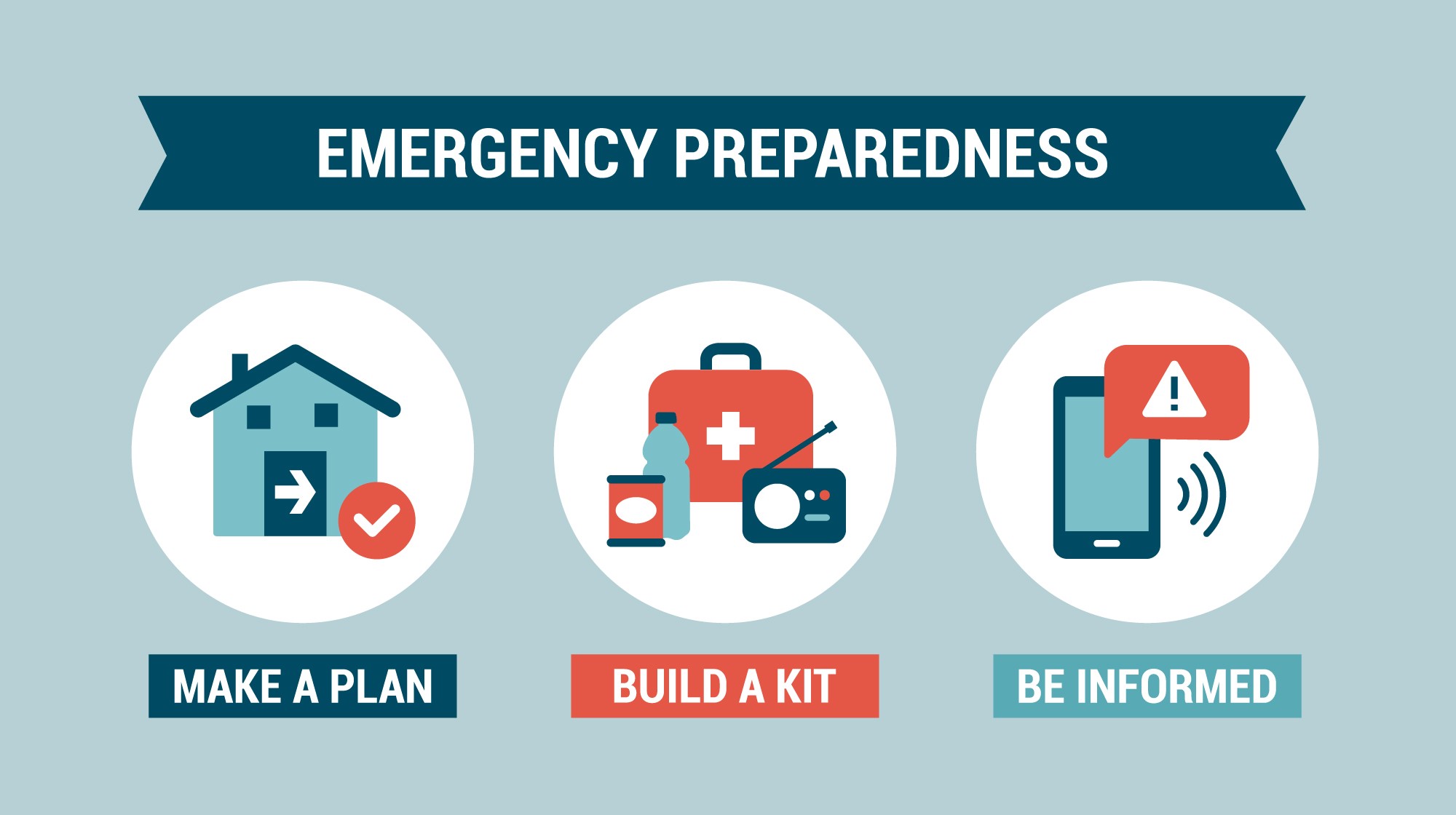Environment and Climate Change Canada has issued special weather statements for several parts of the province. This is a cold weather warning; parts of the province will experience the first stretch of below zero temperatures of the season. Now is a good time to begin preparing for extreme cold events. The first cold temperatures of the season can lead to increased risks of frostbite, hypothermia if outside and not dressed warm enough, slips and falls, transportation challenges, and power outages which can affect access to heat, water and food.
There are some steps you can take to ensure you, your family and community remain safe and healthy during cold weather.

Before the cold weather arrives, be sure to build an Emergency Plan.
- Build a grab-and-go kit. You can work with friends, family or community to create kits. It may be more affordable to buy items in bulk to reduce costs. As well, you do not need to buy your supplies all at once. Look at items you have around the house that can be used for your grab-and-go kit or slowly add to your kit over time.
- Think about how you will keep warm if the power goes out (i.e., blankets, warm seasonal clothing)
- Do you have enough prescription and traditional medicines to last 72 hours?
- Do you have or can you be a winter weather buddy? This is a person who can check in on you, shovel your sidewalk, and make sure you are supported. Elders may be most in need of a winter weather buddy.
- Have you checked your fire extinguishers and smoke alarms are working?
During the cold weather:
- Check in on Elders (be a winter weather buddy) and other people in your community who may need extra help
- Visit DriveBC.ca for current road and highway conditions. There are nearly 900 highway webcam views across over 450 locations in BC.
- Check the weather forecast and consider postponing travel, especially in bad road conditions. If travel is necessary, ensure you have a full tank of gas or electrical charge, windshield scraper and snow brush, food and water, and a first aid kit.
- Activate your Emergency Plan as necessary. Ensure your vehicle also has an emergency kit and warm clothing if you need to get out of your vehicle.
Who is most at risk?
It is important to monitor yourself, family members, Elders and other people in your community who may need extra help. Consider developing a check-in system for neighbours and friends who are at higher risk during colder weather. The most at-risk individuals may include:
- Elders
- People who live alone
- People with mental illnesses (e.g., schizophrenia, depression, anxiety, etc.)
- People with pre-existing health conditions (e.g., diabetes, heart disease, respiratory disease, etc.)
- People with substance use disorders
- People with disabilities or who have limited mobility
- People who are unhoused or marginally housed
- People who are pregnant
- Infants and young children
For optimal health during extreme cold events:
- Stay indoors near heated spaces as much as possible
- Always wear clothing appropriate for the weather. Dressing in layers is recommended, with a wind and water resistant outer layer.
- To avoid frostbite, cover as much exposed skin as possible with hats, scarves, and gloves. To stay dry and warm, change out of clothing that has become wet.
Find emergency shelter information and resources, including extreme weather shelters, by calling BC's Shelter and Street Helpline at 2-1-1 or see the BC Housing: Shelter Map. EmergencyInfoBC has a list of warming centres and emergency shelters that can provide protection from Hypothermia and Cold Temperature Exposure during extreme cold weather. Find Warming Centres on the EmergencyInfoBC website.
Symptoms of hypothermia include shivering, feeling exhausted or like you need to sleep, confusion, inability to feel your fingers or fumbling hands, memory loss and slurred speech. Hypothermia is a medical emergency and you should call 9-1-1.
For non-emergency medical care, you can call 8-1-1 and be connected with a nurse at HealthLinkBC. If available, you can also visit your community health nurse or call your local health centre.
To connect with a culturally safe medical professional you can visit the First Nations Virtual Doctor of the Day. Call toll-free, seven days a week from 8:30 a.m. to 4:30 p.m.: 1-855-344-3800.
For mental health and cultural supports:
First Nations Health Authority (PDF)
Tsow-Tun-Le-Lum (cultural support and counselling): 1-888-403-3123
KUU-US Crisis Line Society: Adults and Elders at 250-723-4050; Children and Youth at 250-723-2040; Toll-free at 1-800-588-8717

